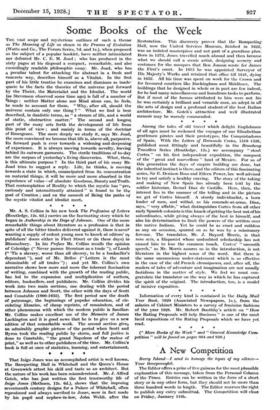Among the tales of old travel which delight Englishmen of
all ages must be reckoned the voyages of our Elizabethan gentlemen pirates and their prototypes, the Conquistadores of Spain. With the Letters of Hernando Cortes, 1519-1526, published most fittingly and beautifully in the Broadway Travellers Series (Routledge, 15s.) we accompany " stout Cortes " on his first independent expedition, the conquest of the " great and marvellous " land of Mexico. For us of this generation the days of empire building are done, but the inherited instinct is there, and the editors of this fascinating series, Sir E. Denison Ross and Eileen Power, Ire well advised to try and satisfy a healthy craving. The story of the taking and making of New Spain has already been told by the soldier historian, Bernal Diaz de Castillo. Here, then, the interest lies in the manner of the telling and in the picture we get of Cortes himself. A sturdy individualist, a born leader of men, and withal, as his comrade-at-arms, Diaz, says, " very affable," what distinguishes Cortes from all other early Spanish colonists is this knack of getting the best out of his subordinates, while giving always of the best in himself, and also his determination to limit the powers of the settlers over the native Indians. Yet he could be as cruel and ruthless as any on occasion, spurred on as he was by a missionary fervour. The translator, Mr. J. Bayard Morris, is that rara axis, a Hispanist whose undoubted scholarship has not caused him to lose the common touch. Cortes' " uncouth speech," as Mr. Morris assures us in the introduction, is not literature in the highest sense of the word. But there is the same unconscious under-statement which is so effective in the case of the old French chroniqueurs, and, after all, the readers of tales of adventure and imagination are not usually fastidious in the matter of style. We feel we must con- gratulate the translator on the way in which he has captured the spirit of the original. The introduction, too, is a model of incisive exposition. * * * *








































 Previous page
Previous page